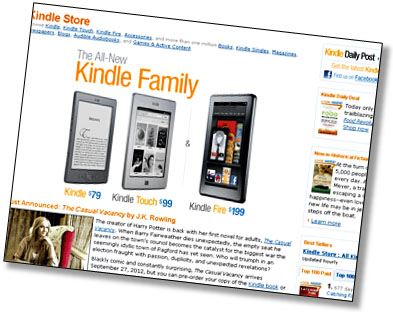Enough of this cancer nonsense. Let’s agree and disagree with Matt Yglesias today (not that I’m comparing him with cancer, mind you).
First off, the disagreement. In the current issue of the New Republic, Franklin Foer pens a righteous rant against Amazon as an evil, marauding monopoly that needs to be crushed. It warmed the cockles of my heart, since Amazon’s almost Luthor-like predatory strategies against startup competitors leave me cold. That’s one reason I choose not to do much business with them. But legally? I may not like the way Amazon went after Diapers.com, but let’s face it: they’re nothing close to a monopolist in that space. Yglesias is right that in most of their business lines they should be left alone. Walmart and Target and Google and a tsunami of aggressive startups will keep them plenty busy.
However, there’s an exception: e-books. Yglesias has no sympathy for big book publishers, and he has a point. These are pretty gigantic companies in their own right, and although I suspect he gives their business practices  short shrift in some important ways, there’s not much question they often seem pretty antediluvian. But this goes too far:
short shrift in some important ways, there’s not much question they often seem pretty antediluvian. But this goes too far:
It is undeniably true that Amazon has a very large share of the market for e-books. What is not true is that Amazon faces a lack of competition in the digital book market. Barnes & Noble — a company that knows something about books — sells e-books, and does so in partnership with a small outfit called Microsoft. Apple sells e-books and so does Google.
Amazon has a huge share of the e-book market, and pretty much everyone—including Yglesias, I think—believes that Barnes & Noble is only a few steps from the grave. Unsurprisingly, Nook funding is in free fall. Sony has exited the e-book market and Kobo isn’t far behind. Even Apple, as mighty as it is, has only a tiny market share after several years of trying.
In theory, this is a great opportunity for an innovative startup. Startup costs are modest since there’s no physical inventory to worry about. Publishers are eager for new entrants. Maybe a smart startup could appeal to consumers with a great new e-reader concept. Or a better recommendation engine. Who knows? There are loads of possibilities. The problem is that no startup can possibly compete with a huge incumbent that’s willing to sell e-books at a loss. There’s no VC on the planet willing to fund a trench war like that.
So Amazon really does have a monopoly position in this market that it sustains via predatory pricing and heavy-handed business practices—against publishers both big and small—that might make John D. Rockefeller blush. Tim Lee pinpoints a big part of the problem:
I mostly agree with my colleague Matt Yglesias’s argument that Amazon is doing the world a favor by crushing book publishers. But there’s at least one way US law gives Amazon excessive power, to the detriment of publishers, authors, and the reading public: ill-conceived copyright regulations lock consumers into Kindle’s book platform, making it hard for new e-book platforms to gain traction.
….In 1998 [music publishers] got Congress to pass the Digital Millennium Copyright Act, which made it a federal crime to unscramble encrypted content without the permission of copyright holders.
….While the law was passed at the behest of content creators, it also gave a lot of power to platform owners. If you buy a movie on iTunes, you’re effectively forced to continue buying Apple devices if you want to keep watching the movie. Tools to transfer copy-protected movies you’ve purchased from iTunes onto another platform exist, but they’re illegal and, accordingly, not very user-friendly.
Amazon has taken advantage of the DMCA too. Kindle books come copy-protected so that only Amazon-approved software can read it without breaking the law. Of course, software to convert it to other formats exists, but it’s illegal and accordingly isn’t very convenient or user-friendly.
And that creates a huge barrier to entry.
Aside from my general distaste for Amazon, I happen to think the Kindle app is kind of sucky. The Nook app is better, so I buy my e-books via Barnes & Noble. But the Nook app has its own problems, and you may prefer Kindle. That’s great! Competition! But I’m keenly aware that B&N is likely on its last legs, and then what? Amazon will have even less incentive to improve its reader, especially on less popular platforms.
I like competition. And it can’t be emphasized too much that the DRM issue is driven heavily by publishers, not just by Amazon. Nor is there a simple solution. Arguments of the techno-utopian “information wants to be free” crowd aside, there are pretty self-evident reasons why authors and publishers don’t want their books to be instantly available for free within a week of being published.
Nonetheless, this is a problem that begs for a solution. Partly it’s driven by DMCA restrictions. Partly it’s driven by those antediluvian publishers. And partly it’s driven by Amazon’s genuine monopoly position in the e-book market, which stifles innovation and promises to get even worse in the future.
So sure, leave Amazon alone in most of its business lines. But in e-books? Nope. They’re a monopoly in every sense of the word, and they use predatory practices to stay that way. They may offer cheap books, but in the long run it’s vibrant competition that truly benefits consumers. Regulating Amazon would hardly solve all our e-book problems—far from it—but it would be a start.















